History Behind Victory Day Russia And Significance Of Putin's Victory Day Speech 2022
On May 9, 2022, Russian President Vladimir Putin gave a speech during the Victory Day military parade at Red Square in central Moscow to commemorate the victory over Nazi Germany during World War II. Russian servicewomen marched on Red Square and military vehicles were paraded as part of the celebration.
Victory Day is always a big holiday in Russia: It marks the Soviet Union’s victory over Nazi Germany in World War II, a conflict during which more than 8 million Soviet soldiers died.
But this year, as Russia’s war on Ukraine continues, the day will take on new meaning. Since Russia invaded Ukraine on Feb. 24, there’s been speculation about whether Victory Day will mark a turning point in the war that has already killed thousands and forced millions to flee from their homes.
In March, the Kyiv Independent reported that Russian troops were being told the war must end by May 9, while more recently, U.S. and western officials have openly wondered if Russia will officially declare war on May 9, escalating what Russian President Vladimir Putin has insisted is merely a “special military operation.” But on May 1, Russia’s foreign minister Sergei Lavrov said, “Our military will not artificially adjust their actions to any date, including Victory Day,” the Moscow Times reported.
“We will solemnly celebrate May 9, as we always do,” Lavrov continued. “Remember those who fell for the liberation of Russia and other republics of the former U.S.S.R., for the liberation of Europe from the Nazi plague.”
World War II has shaped Putin’s approach to the Russia-Ukraine war; In justifying the invasion of Ukraine, he claimed he had set out to “denazify” the country—a phrase that many pundits noted is inaccurate in this context given Ukraine has a Jewish President.
World War II has always been central to the Russian state’s approach to telling the country’s history. While the Allies marked May 7 as “V-E Day”—Victory in Europe Day—to commemorate the Nazis surrendering in Reims, France, Soviet leader Joseph Stalin wanted to wait to celebrate until the Nazis surrendered in Soviet-controlled Berlin the next day. By the time the text was signed late at night, it was already May 9 on Moscow time.
As TIME has previously reported, in the 1960s Soviet leader Leonid Brezhnev made May 9 a national holiday, complete with military parades. Russia’s first post-Soviet President Boris Yeltsin turned those into an annual tradition; under Putin, hundreds of thousands of spectators have gathered to watch military personnel march alongside tanks and missiles. Billboards and buses have featured posters of Stalin for Victory Day. Tens of millions of Russian citizens have marched in Moscow carrying portraits of relatives who died in World War II. Ivan I. Kurilla, a professor at the European University of St. Petersburg, told the New York Times in 2018 that acknowledgement of family sacrifices during the war “is probably the only social glue to form a single society” in Russia.
But scholars say that often lost in the Victory Day celebrations are hard truths about what Russia’s victory in the war really meant. “The Stalin regime was almost as criminal as the Hitler regime,” scholar Nikolay Koposov stated in a Wilson Center webcast in 2020, “and most Russians do not realize that the war was not for their freedoms but was largely a battle between the two dictators.”
Read more: Chancellor Olaf Scholz Wants to Transform Germany’s Place in the World. He’d Just Rather Not Talk About It
Pundits in Russia have pointed out that Victory Day has also become about more than just celebrating Russia’s military achievements in the past; it’s very much about galvanizing support for Russia in the present and showing off the strength of Russia’s military forces.
Journalist Andrei Kolesnikov wrote in a 2017 article about the modern-day significance of Victory Day that it’s “central” to Putin’s view of Russian history, and “the Great Patriotic War” has become his nickname for World War II. “The current regime, which calls itself the sole heir of this victory, uses this achievement to make itself immune to criticism on other issues while justifying its current militarization efforts and excessive state interference in all aspects of life,” Kolesnikov wrote. “In its official conception, Russia’s commemoration of Victory Day in 1945 is only formally an occasion for collectively mourning for Russia’s war dead. It has turned instead into an instrument for providing support to the most militarized, bellicose kind of Russian leader.”
In the walk-up to Victory Day this year, the United Nations says that the Russia-Ukraine war has displaced more than 5 million Ukrainians so far—and projects it will displace more than 8 million before it’s done.
Putin's Victory Day Speech And The Significance Of What Was Not Said Today.
In the end, what was notable about Russian President Vladimir Putin's speech during Victory Day ceremonies was what he did not say.
He did not declare a general mobilization for all-out war against Ukraine.
He did not declare victory in a war that is now in its 75th day.
He made no threat about Russia's nuclear arsenal, something he and other officials have done repeatedly in recent weeks.
He mentioned Nazis but not "de-Nazification," one of the Kremlin's declared goals for the war.
He did not even make a general call to rally around the flag, to gird the Russian population for great sacrifice in, or because of, the war.
For close watchers of Putin's presidency, his May 9 speech had been shaping up to be one of the most consequential of his 22 years as Russia's preeminent leader -- a harbinger of more war, or possibly peace, to come.
If major declarations were forthcoming, Victory Day -- a sacrosanct holiday for millions in Russia and a time when Putin is at the center of global attention -- would seem to be the likeliest venue.
Like in many of his past Victory Day speeches, Putin honored the millions of Soviet citizens who died fighting Nazi Germany. As in some, though not all, of his past speeches, he used the moment to bash the United States.
With the Kremlin now waging the largest land war in Europe since World War II, many observers sought clues as to how Putin would frame the war in Ukraine, which is by all accounts -- except for his own and a few others -- is not going well for Russia.
In the end, the 12-minute speech offered little or no clarity. It also offered no transformative policy shift on the biggest foreign policy crisis of Putin's leadership.
"My first reaction is that he is in for a long haul, but expects to muddle through in the same way as after the annexation of Crimea, yet with a territorial buffer in southern Ukraine," said Vladislav Zubok, a Russian Cold War expert and professor at the London School of Economics. He was referring to Russia's takeover of Crimea in 2014 and its seizure of control of parts of southern Ukraine since the invasion on February 24.
"Another option is possible: with the iron curtain around Russia built by Western powers' sanctions, Putin has secured his own regime, and will be satisfied with it for years and years," Zubok said in an e-mail. "After all he is already [almost] 70. This option, however, presupposes a completely cold and cynical leader, whose rhetoric of sacrifice and victory is just one big 'bla-bla.'"
The annual parade pomp included the usual appearance of hundreds of soldiers, sailors, and other military personnel marching past the reviewing stand on the Kremlin's eastern walls, along with the belching roars of tanks, armored vehicles, and truck-borne intercontinental ballistic missiles.
Unusually, there was no "air parade" of bombers, fighter jets, and helicopters shooting across the skies above central Moscow, for many a highlight of the annual event. Its absence wasn't necessarily indicative of some major event, though its cancelation was announced by Kremlin spokesman Dmitry Peskov mere minutes before the ceremonies began. He blamed the weather.
Putin's speech contained important elements of the mythologizing of World War II, whose memory has been stretched -- or distorted, as some Russian observers argue: "the cult of Victory," as caustic commentator and Kremlin critic Yulia Latynina described it.
"This cult of war has nothing to do with the real history of World War II," she wrote. "It is a cult of the new Russian totalitarianism, the ideology of which is very simple."
As many as 27 million Soviet citizens died in the four years of battling Nazi Germany, a loss that has been seared into generations since.
Putin paid homage to that loss. "Victory Day is near and dear to each of us. There is no family in Russia that was not scorched by the Great Patriotic War. Its memory never fades," he said in his speech.
By contrast, the scope of Russia's losses in the Ukraine war have been shrouded from the Russian public. March 27 was the last time the Defense Ministry released any official death toll, and that tally -- 1,351 -- is just a fraction of what Ukrainian and Western officials say is the true toll, estimated at more than 15,000.
On the battlefield in Ukraine, Russian forces were thwarted in the early days of the invasion, failing to seize Kyiv or other major cities, before recalibrating, and shifting troops to an offensive in the eastern Donbas region.
That offensive is still ongoing and shows little sign of major achievements for Russia's military.
Even the port city of Mariupol, which Russian commanders made a priority due to its strategic location and other reasons, and expected to capture weeks ago, remains contested, despite Putin's own declaration on April 21 of victory there.
In the address, he did not mention Mariupol -- or any other territory that Russia has occupied -- by name.
"My interpretation is that it was a flat affair, because almost anything he could have done would be difficult," said Andrew Wood, a former British ambassador to Russia. "There is no triumph, for example, in Mariupol. I actually don't think he knows what to do."
"It's a feeling that something is wrong, and they've not any idea about how to fix it. That's the takeaway I have," he told RFE/RL.
A growing number of Western military experts say the high death toll among Russian troops, as well as high rates of equipment loss, is a major impediment to any claim of a decisive victory -- a fundamental problem that likely can only be solved with more troops.
That means either calling up reservists, or sending relatively young, inexperienced conscripts into the fight -- or, more extreme, announcing a general, mass mobilization of society.
Some observers speculated Putin might do this, couching it in the historic symbolism of the Great Patriotic War, as World War II is frequently called in Russia.
That didn't happen, possibly because it would involve declaring war, something the Kremlin has refused to call the invasion to date, instead describing it with the euphemistic term "special military operation."
"Putin used to excel at posturing and manipulation and bluffing -- and appears lost in managing a real war, entirely of his own making," said Pavel Baev, a political scientist and research professor at the Peace Research Institute Oslo. "Even calling the war by its real name, which could have been logical in the context of connecting it with the [Great Patriotic War], is a step too far for him.
"Announcing even a partial mobilization would mean accepting a heavier responsibility than the execution of the 'special operation' implies, and the hollow speech signifies a major failure of leadership, which is particularly apparent in comparison with Zelenskiy's outstanding performance," Baev said, referring to Ukraine's social-media-savvy president, Volodymyr Zelenskiy.
In addition to mourning the Soviet heroism and losses from 77 years ago, Putin brandished other recurring tropes:
He lashed out at the West, at NATO, and in particular at the United States, accusing it of "humiliating not only the whole world, but also its satellites, which have to pretend that they do not notice anything and meekly swallow it all."
And just as Soviet forces helped defeat Nazism in Europe, he asserted, Russian forces were forced to act against Ukraine in a "preemptive rebuff to aggression" by what he described as Western-backed neo-Nazis and "Banderites." That's а slur used by Russian officials against Ukrainians, referring to 20th-century Ukrainian nationalist leader Stepan Bandera.
"Everything indicated that a clash with neo-Nazis, with Banderites, on whom the United States and their junior partners relied, would be inevitable," he said.
Kyiv, Western governments, and critics of the Kremlin contend that Putin's attempts to justify the invasion as a preemptive strike are entirely unfounded. Officials have argued repeatedly that neither Ukraine nor NATO planned to attack Russia, and that his efforts to liken Ukrainians or their leaders to Nazis are groundless and absurd.
In a speech given shortly after Putin spoke, British Defense Minister Ben Wallace said that it was Putin and his generals who are "and mirroring the fascism and tyranny of 77 years ago, repeating the errors of the last century's totalitarian regime."
While he spoke of neo-Nazis, Putin made no sweeping pronouncements about the "de-Nazification" of Ukraine -- something he had declared was of paramount importance as he announced the beginning of the invasion on February 24.
Dmitry Oreshkin, a Moscow-based political scientist, says he did not expect Putin to make a declaration of war or of a general mobilization, contending that making either move would tarnish his image and underscore questions about his handling of the war.
"If you start a war, then this means admitting that the 'special operation' did not end or ended in nothing, or it turned out to be insufficient. One way or another, it is perceived as a defect," Oreshkin told Current Time.
"And if you announce mobilization, it's the same thing," he said. "It means that [Russia and its military] did not have enough strength, that Ukraine put up unexpectedly powerful resistance, and now we need to invite new people, recruit new manpower."
So, a declaration of war or a mobilization would be something of an admission of defeat, he suggested. But the most telling omission, perhaps -- Putin did not declare victory, either.
Why 9 May Victory Day is so important for Russia
It has become an annual event - the military parade in Red Square in Moscow and cities across Russia on 9 May, marking victory over Nazi Germany in 1945.
Under Vladimir Putin, Victory Day has become a show of strength of troops and military hardware, as well as a chance to remember the sacrifices of World War Two. Twenty-seven million Soviet citizens died, by far the greatest loss of any country, in what Russians call the Great Patriotic War.
This year, the event has taken on a significance of its own. Far from liberating Europe, Russia has waged months of war against its neighbour Ukraine and is devoid of any real form of military victory that it can celebrate.
Regiments that played a key role in the war will parade in front of the top brass and the president, whose address will echo across Red Square and be scrutinised for what to expect next. Russia's leader often uses this moment to send messages of intent.
The Victory Day parade was occasionally marked in the Soviet era and revived by President Boris Yeltsin for the 50th anniversary in 1995, but it was Vladimir Putin in 2008 who made it an annual event featuring military hardware. Russian identity has been largely created with Victory Day in the background, with schoolbooks and history books focusing on Russia as Europe's wartime liberators.
"Even in a normal year it's a huge show of Russia strength, of Putin's control and everything he stands for," says Ammon Cheskin of Glasgow University. "And that's just amplified this year."
Claims that he will declare an end to the campaign have been denied, as have reports that he will announce a full declaration of war or a mobilisation of Russian men. Russia's military would not "artificially adjust" its actions to any particular date, said Foreign Minister Sergei Lavrov.
Something short of full mobilisation could be announced, in response to Russia's big losses on the battlefield. Dozens of ads have appeared on job websites in recent weeks looking for "specialists in mobilisation work", but such a step could hit the president's popularity and 9 May might not be the right time to announce it.
After Russia annexed Crimea in 2014, Vladimir Putin marked Victory Day with a speech in Red Square about defeating fascism, before flying to the Black Sea port of Sevastopol to celebrate his new victory in front of thousands of onlookers.
"This year the primary objective was to announce the victory that was supposed to happen in February," says Ernest Wyciszkiewicz of the Centre for Polish-Russian Dialogue and Understanding. "They are preparing a PR stunt for Monday: it's important for Russians to see that the special military operation they have been hearing about has led to something tangible."
Instead of celebrating the overthrow of Ukraine's government, the Kremlin will have to settle for the capture of most of Mariupol. The city may lie in ruins, but Russia has repeatedly talked of "de-Nazification and demilitarisation" of Ukraine and it may claim defeat of the Azov battalion, which it has falsely portrayed as Nazi. That would resonate on a day marking World War Two.
"In Russian cities and regional capitals we can see signs with the Victory Day symbol," says Olga Irisova, co-founder of analysis group Riddle Russia. "Usually the signs say 9 May 1945 but this year it's 1945/2022, so they're trying to provide people with the idea that once again they're standing up to Nazis."
In Mariupol itself there will be no Victory Day parade because of apparent security threats. Russia's proxy leader in the region, Denis Pushilin, has said a parade will have to wait until Mariupol becomes part of his so-called Donetsk People's Republic.
There will be unspecified festive events, though, and it could feature prominently in Russian coverage. In the run-up to 9 May the city has had visits from Kremlin TV spin doctor Vladimir Solovyov and a delegation from the Kremlin led by the president's deputy chief of staff, Sergei Kiryenko.
The Red Square Victory Day parade is about aesthetics too, and military hardware in particular. It is a chance for the Kremlin to show off its latest weaponry.
It was the Armata T-14 tank that turned heads on Victory Day in 2015, but it has been conspicuous by its absence in the war in Ukraine, because it is not yet ready for frontline combat. Ukraine says it has destroyed well over 1,000 less modern Russian tanks on the battlefield.
There will be less hardware and fewer troops this year than in 2021. But there will still be some 10,000 troops and 129 pieces of military equipment, according to an analysis by BBC Russian. Gone will be one of Russia's newest tanks, the T-80BVM, as well as the Pantsir-S1 anti-aircraft missile system.
The aerial display will be just as big as before, with 77 planes and helicopters, and the air force has been rehearsing over Red Square in a Z-formation - the controversial symbol adopted by invading forces.
But there will be no foreign leaders this year, which the Kremlin puts down to the 77th anniversary not being a significant event in itself.
Most of the messaging around Victory Day is directed at the Russian population anyway, says Olga Irisova. By harnessing the Nazi narrative from World War Two, the Kremlin is able to stir up strong feelings because most Russians have relatives who either died or struggled in the war.
While events will take place across Russia, in neighbouring countries 9 May has become less and less significant. Ukraine saw some of the greatest losses in the war and a recent opinion poll suggested that the date should be seen as a day of remembrance rather than victory.
Kazakhstan has cancelled its military parade for a third year running and Latvia has declared it a day of remembrance - for victims of Russia's war in Ukraine.
On the brink of its May 9 Victory Day celebrations, Russia looks very far from triumph in its war in Ukraine. And all of its options going forward are fraught with danger.
After a disastrous assault on Kyiv, Russia is engaged in an attempt to take territory in Ukraine’s east, as its military nears exhaustion and sanctions continue to escalate.
“With the current force that they have, the push that they’re attempting now is all that they have left,” said Jeffrey Edmonds, former director for Russia on the US national security council and senior analyst at the CNA thinktank.
“Militaries just don’t recover that quickly from such a devastating loss. And given how effective the Ukrainians have been with our support, I just don’t think they’re going to be able to achieve their objectives within the coming weeks. And the coming weeks are going to be the telltale of where this is going.”
Facing setbacks, officials have suggested that Vladimir Putin may use the May 9 holiday to repackage the war in Ukraine. Dramatic options include escalation through a formal declaration of war or general mobilisation – or de-escalating by proclaiming victory.
Alternatively, Putin could offer up a “sandwich”, as one analyst put it, that praises the Russian army’s “victory” while preparing the population for a grinding and painful conflict as status quo.
Ukrainian officials in particular have warned that Putin is planning to announce a mass mobilisation, or even to declare war against Ukraine, calling up personnel and resources that were untapped under Russia’s so-called “special operation” that began on 24 February.
“Russia has already moved to covert mobilisation and is preparing to announce open mobilisation in the near future,” said Kyrylo Budanov, the head of Ukraine’s military intelligence, in an interview this week with the Ukrainian news outlet New Times. “I’m quite curious: how will they explain this to their own people?”
The Kremlin has denied it is planning a mobilisation, although some Russians have leaked call-up papers and state orders relating to a potential mobilisation online. A number of enlistment offices have been targeted in arson attacks since March, including one in remote Nizhnevartovsk last week as rumours of a coming mobilisation grew.
But a formal mobilisation, which could see tens of thousands of reservists pulled from their jobs, and borders closed to fighting-age men, is something that Russia has never managed before. It would be highly disruptive to the economy and would further raise the stakes in a war where Russia has already disappointed on the battlefield.
“Proclaiming mobilisation will make this war highly unpopular,” said Pavel Luzin, a Russian military expert. He also questioned whether it would be “technically possible” – “What can you do with the mobilised people? Which officers and military units can deal with them?”
“This is no magic pill for them, it’s not a get-out-of-jail free card for Putin,” Edmonds said, noting that by the time new troops were brought up, the “Russians could be falling apart”.
Fearing defeat, Russia may threaten to raise the stakes even further. Top propagandist Dmitry Kiselyov showed a simulation of a nuclear strike against the UK on national television this week. “Just one launch, Boris, and England is gone,” he said. “Once and for all. Why play with us?”
Putin may also hint at the potential for nuclear conflict as he stands before the heavy weaponry, including intercontinental ballistic missiles, that he returned to the Red Square parade in 2008.
“He also knows that we’re going to be listening to him, so I wouldn’t be surprised if there’s some nuclear rhetoric in there as well,” said the CNA’s Edmonds.
He said he remained sceptical that Russia could use a tactical nuclear weapon in the conflict, but like others noted that the Kremlin has become more unpredictable. “If Putin sees this as becoming existential, then all bets are off the table.”
Seeing the limited potential for victory, Putin could also seek to de-escalate the conflict. Standing before his military and the country on Monday, Putin could announce that Russia has achieved its major war aims in Ukraine by allegedly destroying Ukrainian military capacity, and by taking near control of several mid-sized cities such as Mariupol and Kherson.
But that may also be a tough sell, as the Ukrainian military could try to retake lost ground, leading to further losses even if Russia stakes a defensive position.
A senior Russian official last week in Kherson said that Russia had returned “forever,” making the idea of a political settlement that would return control of its territory to Ukraine even more remote.
And as Ben Noble, an associate professor of Russian politics at University College London, noted, the Kremlin’s vague and changing war aims have meant that many people in Russia may be left unsatisfied with whatever Putin eventually claims as victory.
“That’s probably the strongest reason why many people say that the Kremlin is in a corner now, that they’re stuck, because they’re inevitably going to disappoint some groups with whatever they claim as a victory in the broader term,” he said.
Expectations of a big announcement on 9 May, he said, may speak more to the frustration among those outside the Kremlin than to the fact that anything meaningful will be announced. “They want a sense of certainty, they want a new chapter in this conflict,” he said.
While the Kremlin may feel political and economic pressure to end the war, a grinding conflict may be better than admitting defeat.
“I assume he will use the 9th of May to somehow address the victory … something a lot of sociologists tell us is that Russians want this to be over but in a good way,” said Anton Barbashin, the editorial director at Riddle Russia and a political analyst.
“But I would expect that he also needs to introduce some new challenges as well. It needs to be a sandwich, it can’t be just victory. There is so much going on, and by now Putin is aware of the economic risks and problems that are going to arise quite soon. So you probably need to propose a strong vision of how Russia is challenged.”
That is already visible in state media reports that explain Russia is at war with Nato rather than just with Ukraine in order to justify some of the military’s recent defeats.
The Kremlin is also facing an urgent ideological challenge, Barbashin noted, as the war increasingly begins to affect ordinary Russians who may not have a clear idea of why Russia decided that it would invade Ukraine in the first place.
“The more I think of it, the more astonishing it is that this war has shown that Russia has no ideology whatsoever,” he said.
“They’re trying to come up with something new but none of it actually makes sense. Russians do not understand what the hell Russia is doing there.”
Victory Day … as seen on TV
While Russia’s main military parade will be held on Red Square on 9 May, for millions of Russians, Victory Day is a spectacle that will play out on state television.
The national holiday is spent with the TV on in many households, where the parade is bookended by news broadcasts and, usually, by Soviet war films and Russian blockbusters about the second world war. But this year may be different.
The parade, which begins at 10am with a review of the troops and a speech by Putin, is among the most-watched programmes of the entire year in Russia. State-affiliated pollsters estimate that more than half of households watch it, although those numbers could be inflated.
While rumours have swirled about a major announcement by Putin of a military mobilisation or a “mission accomplished” message, he usually dedicates the speech to familiar lines about the “spectre of fascism” and a recognition of veterans of what Russia calls the Great Patriotic War.
VICTORY PARADE TOOK PLACE ON THE RED SQUARE
June 24, 1945 at 10:00 a.m. on the Red Square, Moscow, took place a parade to commemorate the victory of the Soviet Union over Nazi Germany in the Great Patriotic War. The parade was received by the First Deputy People's Commissar of Defense and Deputy Supreme Commander, the commander of the 1st Belorussian Front, Marshal of the Soviet Union, G. K. Zhukov. In charge of the parade was the commander of the 2nd Belorussian Front, Marshal of the Soviet Union, K. K. Rokossovsky.
June 22, 1945 the major Soviet newspapers published an order of the Supreme Commander, I. V. Stalin N 370: "In commemoration of the victory over Germany in the Great Patriotic War, I appoint to hold the parade of the regular Army, Navy and the Moscow garrison - Victory Parade June 24, 1945 in Moscow's Red Square."
In late May and early June in Moscow was held intensive preparations for the parade. In early June all the participants of the parade, wearing a new dress uniform, proceeded to the pre workout. Rehearsal for infantry units was taking place in the Khodynka field, in the Central Terminal; on the Garden Ring, from the Crimean Bridge to the Smolensk Place, was held inspection of artillery units; mechanized and armored vehicles held training on the testing area in Kuzminki.
To participate in the ceremony were formed and trained regiments representing each front which was in force at the end of the war, led by commanders of the fronts. It was decided to bring from Berlin the Red flag, hoisted over the Reichstag. The formation of the parade was in accordance with the general line of the fronts in force – from right to left. For each regiment were chosen their favorite military marches.
The penultimate rehearsal for Victory Day parade was held at the Central Airfield, and the general one - in Red Square. June 22 at 10 am, Marshals of the Soviet Union, G. K. Zhukov and K. K. Rokossovsky appeared on Red Square on a white horse and a black horse. After the command "Parade, quiet!" the square was swept with a roar of applause. Then, the combined military orchestra of 1400musicians conducted by Major-General, Sergei Chernetsky played the hymn "Glory to the Russian people!" by M. I. Glinka. After that, the commander of the parade, Rokossovsky reported on the readiness for the start of the parade. The marshals made a detour of troops, and returned to the Lenin Mausoleum. Zhukov, having got up to the podium, on behalf of the Soviet government and the CPSU (b) congratulated "brave Soviet soldiers and all the people with the Great Victory over Nazi Germany." Anthem of the Soviet Union was played and a solemn march of the troops began.
The victory parade was attended by the regiments of the fronts, of the People's Commissariat of Defense and the Navy, military academies, colleges, and units of the Moscow garrison. Combined regiments included the rank and file, sergeants and officers of different arms, who had distinguished themselves in battle and had been awarded with military orders. Following the regiments of the fronts and the Navy, on Red Square entered the combined column of Soviet soldiers who were carrying, dropped to the ground, 200 banners of Nazi troops, defeated on the battlefield. These banners were thrown to the foot of the mausoleum as a sign of a crushing defeat of the aggressor. Then solemnly marched the units of the Moscow garrison: the combined regiment of the People's Commissariat of Defense, the military academy, military and Suvorov schools, half-horse brigade, artillery, motorized, airborne and tank units and subunits.
At 23 p. m. the sky over Moscow lit up with searchlights, in the air there were hundreds of balloons, and from the ground were heard the volleys of fireworks with colorful lights. The highlight of the holiday was the cloth with the image of the Order of "Victory", which appeared in the sky in the spotlight.
The next day, June 25, the Grand Kremlin Palace hosted a reception in honor of the Victory Day parade. After a grand celebration in Moscow, upon the suggestion of the Soviet government and the Supreme Command, in September 1945, there was held a small parade of allied troops in Berlin, which was attended by Soviet, American, British and French troops.
-
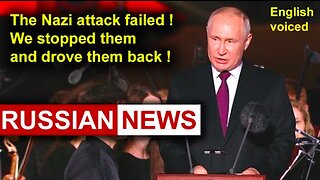 11:45
11:45
deNAZIfication - Special Military QperationZ WORLDWIDE
9 months agoPresident Putin's speech at celebration of the 80th anniversary of the victory in the Battle of Kursk. Russia
1.96K6 -
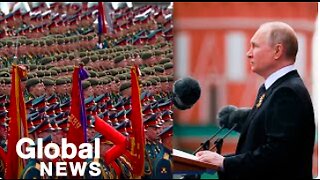 6:57
6:57
deNAZIfication - Special Military QperationZ WORLDWIDE
1 year agoVictory Day parade: Putin recalls defeat of Hitler to spur on Russian army in Ukraine
1.89K1 -
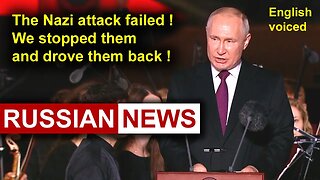 11:45
11:45
Russian News voiced in English
9 months agoPutin's speech at celebration of the 80th anniversary of the victory in the Battle of Kursk. Russia
168 -
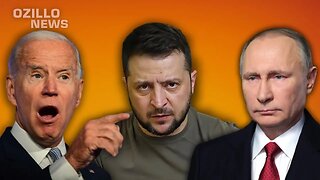 1:28
1:28
Ozillo News
8 months ago3 MINUTES AGO! Very Important Developments in the Ukrainian Russian War!
16 -
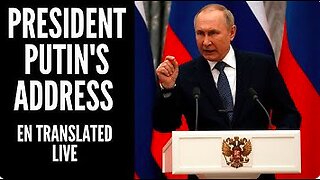 41:19
41:19
deNAZIfication - Special Military QperationZ WORLDWIDE
1 year agoREPLAY: Russian President Vladimir Putin addresses nation ahead of Ukraine war anniversary
13.3K65 -
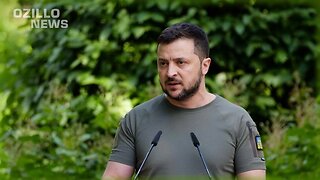 1:44
1:44
Ozillo News
6 months ago3 MINUTES AGO! Very important developments in the Russia Ukraine war!
21 -
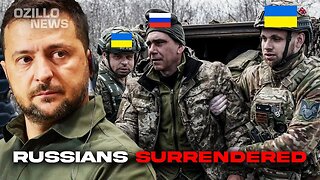 1:45
1:45
Ozillo News
8 months ago4 MINUTES AGO! GREAT VICTORY! Ukrainian Forces Captured Russian Soldiers!
32 -
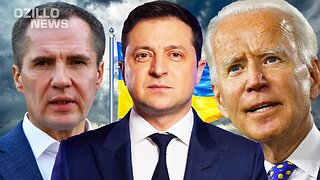 1:50
1:50
Ozillo News
8 months ago3 MINUTES AGO! Very Important Developments in the Ukrainian Russian War!
20 -
![PUTIN JUST WON [HISTORIC SPEECH]](https://hugh.cdn.rumble.cloud/s/s8/1/V/b/b/q/Vbbqg.0kob-small-PUTIN-JUST-WON-HISTORIC-SPE.jpg) 2:16:48
2:16:48
The Dive With Jackson Hinkle
1 year agoPUTIN JUST WON [HISTORIC SPEECH]
4.41K154 -
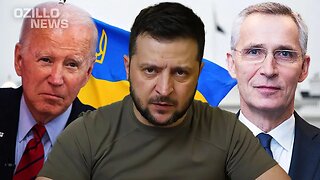 1:45
1:45
Ozillo News
8 months ago3 MINUTES AGO! Very Important Developments in the Ukrainian Russian War!
13